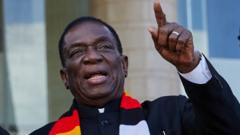Protests have erupted in Turkey after the arrest of prominent opposition politician Ekrem Imamoglu, as President Erdogan's government tightens its grip on power. Demonstrations surged across the nation following Imamoglu's allegations of corruption and subsequent jailing, reflecting a significant shift toward full authoritarianism.
Turkish Protests Erupt Following Arrest of Opposition Leader Ekrem Imamoglu

Turkish Protests Erupt Following Arrest of Opposition Leader Ekrem Imamoglu
Nationwide demonstrations ignite as Istanbul's mayor faces serious charges amidst emerging authoritarian rule in Turkey.
In recent years, countries including Turkey, Hungary, Venezuela, and India have provided insights into the degradation of democratic systems into competitive authoritarianism — where elections exist, yet civil liberties suffer under manipulated rules for the ruling party's benefit. The unfolding situation in Turkey highlights a critical juncture as the government responds to perceived threats from opposition figures.
The recent protests were sparked by the arrest of Ekrem Imamoglu, Istanbul's mayor and a leading opposition candidate for the upcoming presidential elections. The government has leveled accusations against him for accepting bribes, rigging bids, and misusing personal data of citizens. Imamoglu, who claims these allegations are baseless, has been imprisoned while awaiting trial. Adding to the stakes, Istanbul University rescinded Imamoglu’s diploma, which is a requisite for candidates seeking the Turkish presidency.
Imamoglu's increasing popularity posed a significant threat to President Recep Tayyip Erdogan, indicating a potential political challenge in the forthcoming elections. Political experts argue that Erdogan’s strategy indicates a shift toward complete authoritarianism, pre-emptively eliminating a contender who could effectively challenge his rule.
Lisel Hintz, a political scientist at Johns Hopkins University, remarked that Erdogan’s move to jail Imamoglu illustrates an escalation from competitive authoritarianism to overt authoritarian control. “This is clearly a shift in strategy, trying to remove a formidable opponent from the electoral landscape,” she observed, highlighting the increasingly precarious state of democracy in Turkey.
As citizens take to the streets in protest, the situation holds significant implications for the future political landscape in Turkey, and poses questions about the resilience of democratic systems in the face of authoritarian maneuvers.
The recent protests were sparked by the arrest of Ekrem Imamoglu, Istanbul's mayor and a leading opposition candidate for the upcoming presidential elections. The government has leveled accusations against him for accepting bribes, rigging bids, and misusing personal data of citizens. Imamoglu, who claims these allegations are baseless, has been imprisoned while awaiting trial. Adding to the stakes, Istanbul University rescinded Imamoglu’s diploma, which is a requisite for candidates seeking the Turkish presidency.
Imamoglu's increasing popularity posed a significant threat to President Recep Tayyip Erdogan, indicating a potential political challenge in the forthcoming elections. Political experts argue that Erdogan’s strategy indicates a shift toward complete authoritarianism, pre-emptively eliminating a contender who could effectively challenge his rule.
Lisel Hintz, a political scientist at Johns Hopkins University, remarked that Erdogan’s move to jail Imamoglu illustrates an escalation from competitive authoritarianism to overt authoritarian control. “This is clearly a shift in strategy, trying to remove a formidable opponent from the electoral landscape,” she observed, highlighting the increasingly precarious state of democracy in Turkey.
As citizens take to the streets in protest, the situation holds significant implications for the future political landscape in Turkey, and poses questions about the resilience of democratic systems in the face of authoritarian maneuvers.




















